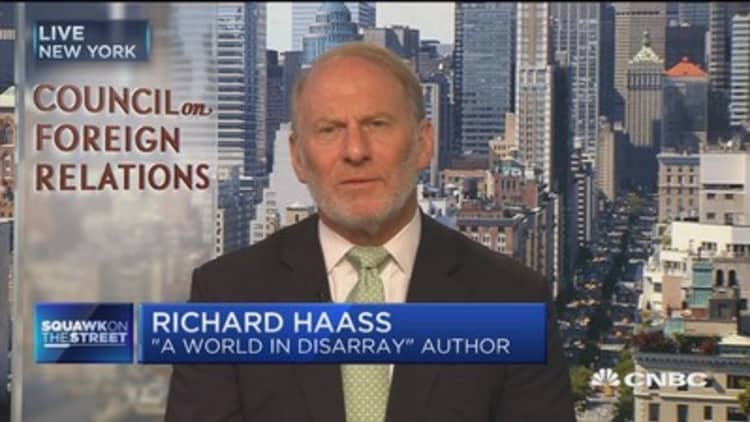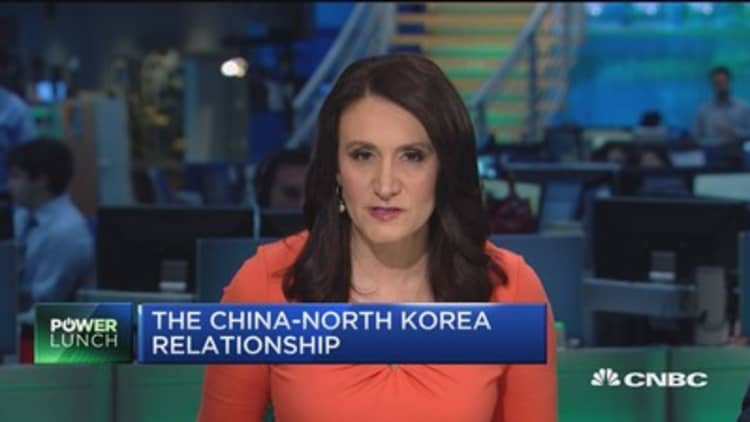
President Donald Trump's latest public criticism of China suggests he could consider more economic actions to put pressure on Beijing to limit North Korean aggression.
In a pair of Wednesday morning tweets after Pyongyang's test of an intercontinental ballistic missile, Trump questioned why the United States should "continue" trade deals with "countries that do not help us." He then said that China — North Korea's only major ally with economic leverage over the isolated nation — saw its trade with North Korea grow "almost 40% in the first quarter."
"So much for China working with us — but we had to give it a try!" Trump tweeted, just before he left for a foreign trip during which he will meet with Chinese President Xi Jinping on the sidelines of a G-20 meeting in Germany.
It is unclear from where Trump got the figure of 40 percent growth in China's trade with North Korea.
Lacking many other options to push North Korea to abandon its nuclear and missile programs, the U.S. has looked to China to pull economic and diplomatic levers. Trump has expressed frustration with Beijing's efforts and recently took actions aimed at putting pressure on China: sanctions against Chinese entities with ties to North Korea, a planned $1.42 billion arms sale to Taiwan and U.S. military movement through contested waters in the South China Sea.
Trump's latest tweets imply those moves "are just the beginning," Ian Bremmer, president of the Eurasia Group, told CNBC on Wednesday. "And that we are gearing up for some tariffs against China, with the possibility of a trade war. No question, that's the big risk here. North Korea's antics make it worse."

Trump's rhetoric suggests he "wants to rev up the pressure on China to really constrain the North Koreans" without entering a dangerous military conflict, added Michael Nacht, a professor of public policy at the University of California, Berkeley, and a former assistant secretary of Defense. The president "really wants to show he means business by showing he can press against the Chinese, as well," Nacht said.
At an emergency United Nations Security Council meeting on Wednesday, U.S. Ambassador to the U.N. Nikki Haley said the U.S. prefers diplomatic action to curb North Korean aggression but will take military action "if we must." She added that the U.S. will propose new U.N. sanctions on North Korea "in the coming days" and threatened to stop trade with countries who do business with North Korea in violation of U.N. sanctions.
Recent reports have suggested that the U.S. could put tariffs on steel from China and other major exporters. Trump and some advisors are "hell-bent" on imposing tariffs on steel "and likely other imports," according to Axios.
It's likely that trade advisor Peter Navarro, who has taken an aggressive stance over policy with China, and Commerce Secretary Wilbur Ross have prepared measures that the White House can use to ratchet up pressure against China, Nacht said. But Trump may have held off on implementing those steps after he left an April meeting in the U.S. with Xi hopeful that China would do more to limit North Korean aggression, Nacht added.
Trump is suggesting that hope has faded.
The White House did not immediately respond to a request to comment on whether Trump's tweets suggest he is considering new actions against China.
Asked Wednesday about Trump's calls for China to put more pressure on North Korea, Chinese Foreign Ministry spokesman Geng Shuang said, "We hope all relevant parties can stay calm and exercise restraint, refrain from words and deeds that may heighten tensions, make joint efforts to bring the Korean Peninsula nuclear issue back to the right track of peaceful settlement through dialogue and consultation as soon as possible."
Beijing has incentives to avoid damaging its economic relationship with the U.S. as China was the biggest source of U.S. imports last year.
But China likely wants to protect its trade with the U.S. while aiming not to imperil North Korea, according to Richard Haass, president of the Council on Foreign Relations.
"China has incentive here not just to see North Korea continue to be an entity, to exist, but also has an incentive to avoid a conflict, to avoid a breakdown in relations with the United States, to avoid all sorts of new economic sanctions," he told CNBC's "Squawk on the Street" on Wednesday.
It remains to be seen if Trump will try to convince Xi to do more on the North Korea situation at Germany's G-20 summit. Shortly after the missile launch was first reported, Trump tweeted that "perhaps China will put a heavy move on North Korea and end this nonsense once and for all!"
Nacht notes that China may not want to take any action that appears to be prompted by Trump.
"If they did something much more tangible against North Korea this would be a signal by the Chinese government that they are acquiescing to the pressure Trump is applying," he said.
— Reuters contributed to this report.
Watch: How North Korea pays for its nuclear weapons



